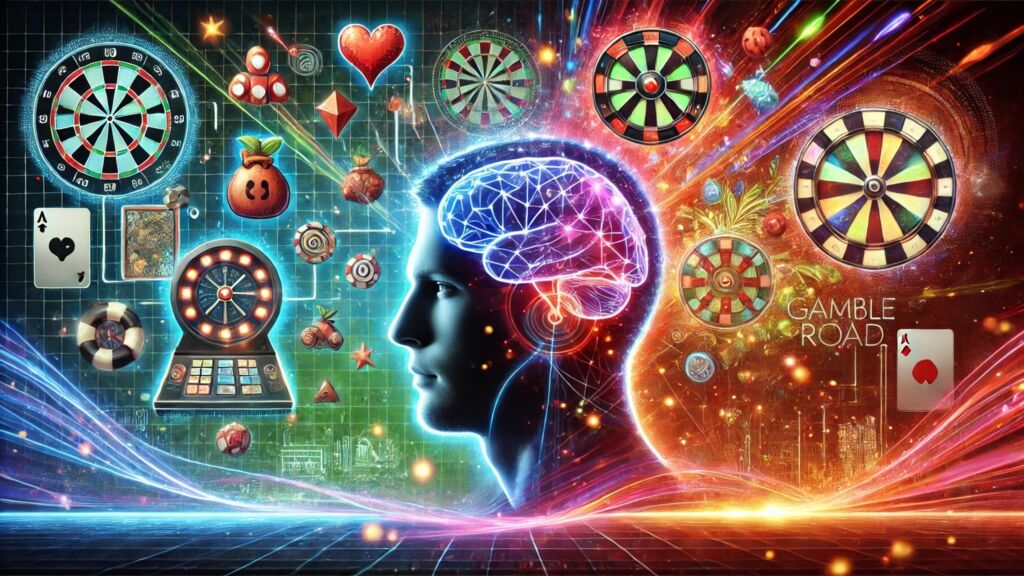Gambling addiction, or Gambling Disorder in clinical terms, is a profound health challenge where individuals feel an unstoppable compulsion to gamble, causing harm to mental health and personal lives. Psychological insights reveal what drives this behavior, proving it's beyond just lack of willpower.
Unpacking the Psychological Complexity Behind Gambling Addiction
Gambling Disorder is a severe behavioral condition marked by an inability to control gambling impulses despite harmful effects. It extends beyond simple enjoyment into a cycle that detriments mental health, finances, and social bonds. Psychological insights are crucial in understanding and managing the addiction.
Exploring Psychological Contributors to Gambling Addiction
Interwoven psychological factors form a bedrock for gambling addiction, covering cognitive, emotional, and personality aspects. Recognizing these is foundational to effective intervention and prevention.
Gambling and Cognitive Distortions: Shaping Perceptions
Cognitive distortions significantly impact gambling addiction, skewing how outcomes are perceived and creating a bias in decision-making. Common misconceptions include:
- The Illusion of Control in Gambling: Gamblers often overestimate their influence over random outcomes, attributing wins to rituals or personal skill rather than chance. For example, one might alter betting patterns on roulette, mistakenly thinking it increases their odds, ignoring randomness.
- The Gambler’s Fallacy Misconception: The false belief that past losses increase chances of future wins. Even if one has lost several times, each game remains independent, unaffected by past outcomes.
- Believing in One’s Gambling Prowess: Overconfidence can lead players to underestimate risks, making bold bets based on perceived skill rather than realistic appraisal, as seen in players overvaluing their bluffing abilities in poker.
- Selective Memory in Gambling: Addicted gamblers recall wins more vividly than losses, distorting reality to seem beneficial. For instance, they might elaborate on significant wins while ignoring the aggregate smaller losses.
- Superstitions in Gambling: Magical thinking leads to beliefs in luck-driven outcomes, reinforcing gambling habits. Gamblers may follow rituals, like wearing 'lucky' attire, believing in its influence on game results.
Emotional Regulation and Gambling
The Role of Emotions in Sustaining Gambling Addiction: Emotional factors are key in both the development and endurance of addiction. Gambling serves as an escape from stress or an emotional void, with key influences being:
- Stress and Anxiety Relief Through Gambling: Many use gambling to momentarily escape life's stresses, benefiting from the diversion it offers. For instance, a stressful day at work might lead someone to online slots as a stress relief option.
- Chasing Excitement: Seeking dopamine-related thrills, gambling creates an addictive rush. The excitement from anticipated wins and near-misses motivate further gambling, creating a cycle driven by thrill-seeking.
- Gambling as an Emotional Shield: Used to soothe feelings of sadness or anger, gambling creates a link between negative emotions and gambling behavior, as individuals gamble to evade emotional pain.
- Gambling and Social Isolation: Despite its potential as a social event, gambling often results in loneliness. Addiction can drive people from social interactions, particularly with the rise of solitary activities like online gambling.
Personality Traits Influencing Gambling Addiction:
Individuals with specific traits may have heightened risk for gambling addiction, not as a direct cause but as contributing factors. These traits include:
- The Impulsiveness Factor: High impulsivity leads people to act without prior thought, making resisting gambling urges difficult.
- Sensation Seeking and Risk Engagement: A higher propensity for seeking thrills makes riskier activities like gambling appealing, fueled by the allure of unpredictability.
- Emotional Instability and Gambling: High neuroticism heightens susceptibility to gambling as a method of coping with undesirable emotions.
- Lack of Organization in Gambling Habits: Individuals low in conscientiousness face challenges managing finances and gambling responsibly, unable to effectively set or follow limits.
The Behavioral Cycle of Gambling Addiction: A Reinforcement Perspective
Behavioral theories view gambling addiction as learned behavior, reinforced by uncertain reward patterns in gambling, offering insight into its persistence.
Unpredictability as a Gambling Addictor: Intermittent rewards in gambling are rare yet powerful, reinforcing addictive patterns. The allure of winning despite losses keeps players entwined.
The Potency of Unpredictable Gains: Wins induce a strong dopamine reaction, emphasizing the joy of gambling, with hope for rewards sustaining engagement.
- Persistent Behavior Through Unpredictable Reinforcements: Even when losing, memories of wins and potential future gains prompt continued gambling behavior, reinforcing the cycle.
- “Near Misses” and Motivation in Gambling: Outcomes close to wins drive further gambling, as near misses are perceived akin to wins, motivating continued play.
- Pavlovian Conditioning and Gambling Urges: Neutral stimuli become triggers when associated with gambling, sparking craving through classical conditioning.
Psychological Insights into Gambling Addiction - Insight from GambleRoad
It's vital to examine gambling addiction from a psychological standpoint to better prevent and treat the condition, particularly because it's deeply entwined with today's world.
- Discover the newest bonuses from casinos, exclusive promotions, and bonus codes that don't require a deposit. Get honest reviews from uptownpokies-app.com.
- A unique category of promotions, these exclusive casino bonuses are offered to certain players, often those who enjoy high-stakes gambling or are part of VIP schemes.
- No Deposit Bonuses at Casinos – These are complimentary bonuses given to new users upon signing up at selected casinos without any initial deposit requirement.
- Online casinos sometimes offer free spins as a bonus, allowing players to enjoy spinning the reels of slot games without risking their personal funds.
When players make their first cash deposit at specific casinos, they often receive deposit bonuses as a welcoming gesture.
Delving into the Psychology of Gambling Addiction
Gambling addiction, also referred to technically as Gambling Disorder, is a grave behavioral health issue. It is marked by a relentless urge to gamble, despite its detrimental effects. This addiction extends beyond mere pleasure and becomes a compulsive cycle negatively impacting mental health, relationships, financial status, and overall well-being. Psychological analysis sheds light on the core reasons behind this addiction, challenging simplistic views of morality or self-control.
How Psychological Dynamics Fuel Gambling Habits
- A combination of psychological elements paves the way for the development of gambling addiction. These factors relate to thought processes, emotional experiences, and personality traits, making some individuals particularly susceptible. Recognizing these psychological contributors is fundamental to crafting successful prevention and intervention.
- Understanding Cognitive Misconceptions in Gambling
- Among the psychological contributors to gambling addiction, cognitive distortions stand out as they warp the perception of gamblers regarding their chances. Regular distortions include controlled illusions, the gambler's fallacy, and overconfidence, which mislead gamblers about their potential to influence outcomes that are essentially random.
Belief of Control: Gamblers often think they have influence over chance results, leading them to rely on rituals or intuition. A roulette player might convince themselves that adjusting their bets will change the outcome, misinterpreting the randomness of the game.
Gamblers' Misunderstanding: This is the belief that outcomes in games of chance are influenced by past results. For example, thinking that after several losses, winning is more likely, though each event in gambling is independent.
- Confidence Overestimation: Some gamblers overrate their skills, leading to riskier bets. A poker player may think their strategic bluffs are better than they are, sometimes culminating in considerable losses.
- Memory Bias: An obsession with remembering wins over losses leads to a distorted view of gambling success. Gamblers may recall significant victories and gloss over the numerous losses leading to an overall deficit.
- Superstition and Luck Beliefs: Relying on lucky clothes or favorite numbers, gamblers may engage in seemingly harmless rituals that perpetuate the illusion of control over gambling outcomes.
- Emotional Underpinnings of Gambling Addiction
Gambling can serve as an unhealthy emotional escape. Factors such as seeking stress relief, chasing excitement, handling negative emotions, like loneliness, or isolation, define vital emotional aspects in gambling addiction development.
Stress Alleviation: Some people use gambling to momentarily distract from life's pressures. The focus required may provide short-lived relief, like someone unwinding with online slots to escape the stress of their day.
Individual Risk Factors
- Thrill and Anticipation: The release of dopamine during gambling enhances pleasure and can create a cycle of thrill-seeking. Anticipation and near-wins sustain this exhilaration.
- Emotional Numbing: Gambling may temporarily mask negative emotions such as guilt or sadness. Engaging in gambling can become a method for escaping such feelings, sometimes leading to a perilous cycle.
- Social Loneliness: Although gambling can be social, it often leads to isolation, particularly with online participation, where gambling replaces genuine human interaction. As addiction deepens, shame can further ostracize individuals.
- Personality Characteristics and Risk Propensity
Certain inherent traits can put a person at increased risk for developing a gambling addiction. These don't determine destiny but indicate a higher susceptibility when combined with other conditions.
- Impulsive Behavior: Highly impulsive individuals often act without fully considering outcomes, making it difficult to resist gambling, even with awareness of its harm.
- Craving Intensity: Risk-takers desiring intense experiences may turn to gambling for gratification. The allure of unpredictability provides exactly the excitement they seek.
- Neurotic Tendency: Those high in neuroticism might be inclined to use gambling as a refuge from constant negative emotions, risking getting caught in its emotional highs and lows.
- Poor Organization: People who struggle with planning and responsibility may find it challenging to manage their gambling responsibly, often failing to adhere to set limits.
Behavioral Aspects: Habit Cycles in Gambling
From a behavioral viewpoint, gambling addiction forms as behaviors are learned and reinforced, especially when gambling's unpredictable nature draws individuals toward repeated engagement.
Random Rewards and the Thrill of Uncertainty
Inconsistently awarded rewards, like those in gambling, heighten gambling appeal as the brain releases more dopamine, escalating pleasure and reinforcing engagement in the activity.
Dopamine and Uncertainty: The uncertainty of rewards increases dopamine spikes, which intensifies pleasure, making gambling particularly addictive.
Persistent Behavior Reinforcement: The intermittent reward schedule within gambling makes interruptions or cessation difficult, making past wins and future anticipation potent motivational forces.
'Close-Call' Experiences: Game designs promising near wins, like slot symbols close but not quite winning, motivate continued play, as they psychologically mimic partial victories, encouraging more gambling.
Conditioned Cues in Gambling Psychology
Cognitive Behavioral Therapy (CBT)
Conditioning plays a significant role in associating unrelated stimuli or environments with gambling desires, transforming them into powerful triggers for those struggling with addiction.
- Delving into Gambling Addiction: Insights from Psychological Approaches
- Grasping the complexities of gambling addiction by viewing it through psychological lenses is essential for developing effective prevention and treatment methods.
- Discover the Newest Casino Bonuses, Unique Promotions, and No Deposit Offers. uptownpokies-app.com Provides Honest Casino Evaluations.
- Exclusive casino promotions are unique deals offered to select players, such as those who spend large sums or participate in VIP schemes.
No Deposit Casino Bonuses refer to free incentives given to new users upon their signup at various casinos.
Online casinos may offer 'free spins,' a bonus allowing users to engage with specific slot games without using personal funds.
- Sign-up bonuses offered by casinos entice new players when they make their initial deposit.
- Gambling Addiction Explored from Psychological Angles
- Examining gambling addiction through psychological approaches provides important insights, particularly as it aligns with contemporary life for prevention and treatment.
- Exploring the Psychological Aspects of Gambling Addiction
Identified clinically as Gambling Disorder, this addiction is a severe mental health condition typified by an uncontrollable impulse to gamble, overshadowing any negative impact on personal and financial well-being. Psychological theories delve into the root causes beyond simplistic conclusions about personality or ethics.
Psychological Elements in Gambling Addiction
Individual Level Prevention
- A myriad of psychological elements coalesce, making some individuals more prone to gambling addiction. By grasping these complexities, one can lay the groundwork for creating intervention and preventive strategies.
- Cognitive Distortions: Misinterpreting Reality within Gambling Contexts
- Perhaps the most influential psychological elements driving gambling addiction are cognitive distortions, which skew one's understanding of reality, especially concerning gambling. Frequent misconceptions include:
Believing in Illusory Control: Gamblers often overestimate their influence in random events, manifesting as rituals or 'lucky' traits believed to sway spin or card results. For instance, someone might think altering their betting strategy affects their roulette outcomes, despite the inherent randomness.
- The Fallacy of the Gambler: This involves wrongly believing past losses in random games predict imminent wins. Each roulette or card event is isolated; prior results don't forecast the next.
- Overconfidence in Ability: Some gamblers overjudge their skills and awareness, leading to riskier bets. A poker player might miscalculate their bluff capacity, resulting in notable financial setbacks.
- Skewed Recollection: Gamblers often more vividly recount their winning streaks compared to their losses, distorting their perception of reality.
- Individuals might remember significant victories and overlook numerous smaller defeats that led to comprehensive losses.
Superstitious Beliefs: This includes irrational beliefs or practices tied to gambling. Whether it's wearing 'lucky' garments or betting on favored numbers, such attitudes reinforce a false sense of control, perpetuating gambling habits.
Emotional dynamics are pivotal in the origination and endurance of gambling addiction. Sometimes, gambling is a misused strategy for handling negative emotions. Emotional influences include:
External Resources:



